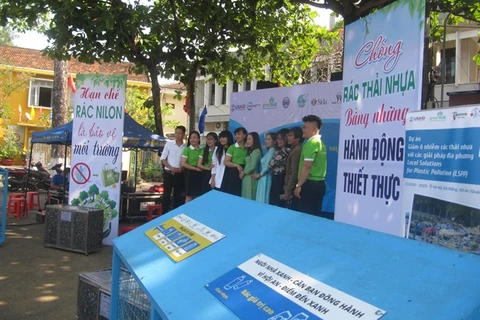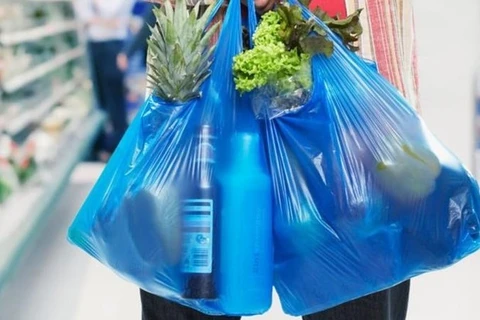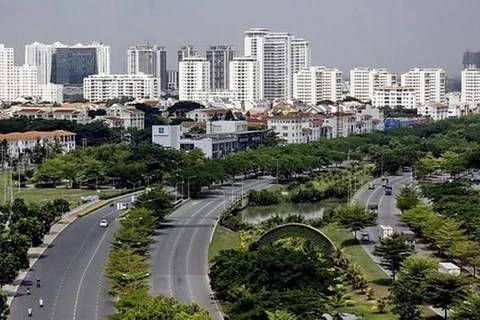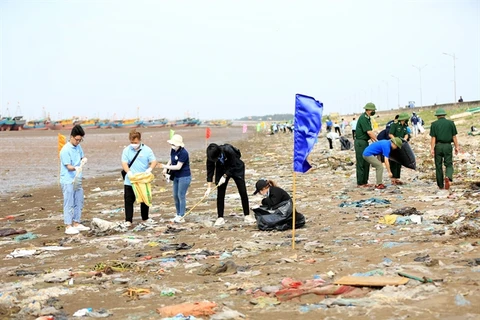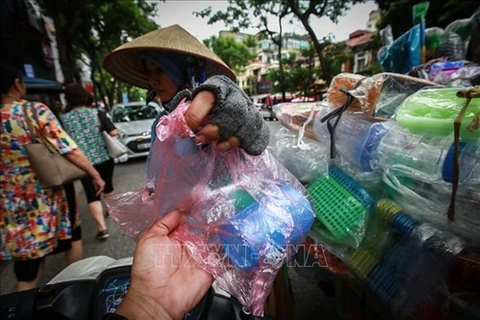 Participants speak at the seminar held in Hanoi on June 16 to review the "Rethinking Plastics - Circular Economy Solutions to Marine Litter" project. (Photo courtesy of the Expertise France)
Participants speak at the seminar held in Hanoi on June 16 to review the "Rethinking Plastics - Circular Economy Solutions to Marine Litter" project. (Photo courtesy of the Expertise France) One of these projects is called "Rethinking Plastics - Circular Economy Solutions to Marine Litter," funded by the European Union and the German Federal Ministry for Economic Cooperation and Development (BMZ) and jointly implemented by the Deutsche Gesellschaft für Internationale Zusammenarbeit (GIZ) and Expertise France, to reduce marine litter and support a transition towards towards the circular economy.
In the closing workshop of the project in Vietnam this week, partners of the project presented results regarding policy development and outcomes of pilot projects in Ho Chi Minh City, Hanoi and Phu Yen.
These pilot projects focused on researching and implementing solutions to the plastic waste problem and improving the collection, sorting and recycling of plastic waste inland and in ports.
The projects' initial outcomes have helped improve the current circumstances in the aforementioned areas and contributed to policy recommendations.
"Rethinking Plastics" helped policymakers build strategies for improving plastic waste management, as well as sustainable consumption and production of plastics and ways to deal with plastic waste in the ocean. One highlight was the contribution to the development of a legal framework for Extended Producer Responsibility (EPR) and the preparation of information and guidelines on EPR.
"The ocean is currently facing never-before-seen threats due to the effects of global warming, as well as unsustainable acts of resources exploitation, pollution and reduction of the marine ecosystem," said Hoang Xuan Huy, Deputy Director of the Department of International Cooperation under the Ministry of Natural Resources and Environment (MONRE).
The United Nations warned that plastic waste had reached the deepest part of the ocean, and humanity must act swiftly.
"It is one of our priorities to contribute to the global effort to solve this problem," said Huy.
Every year, 11 million tonnes of plastic waste are discharged into the ocean worldwide, with 150 million tonnes currently in the ocean, disrupting the food chain of oceanic lifeforms. 75 percent of current plastic-based products will become waste in the future.
Plastic waste pollution is also negatively affecting the economy, with the costs reaching 1.3 billion USD yearly, comprising of greenhouse gas costs, health costs and waste management.
Vietnam is currently one of the top countries discharging plastic waste into the ocean. Plastic consumption in Vietnam has been rising quickly, from 3.8 kg per person in 1990 to 54 kg per person in 2018.
Vietnamese consumption of plastic products comes primarily from packaging with 57 percent and appliances with 29 percent. 80 percent of plastic waste in Vietnam comes from inland, and only 20 percent comes from fisheries.
As Vietnam is committed to solving plastic waste, the country has legalised many aspects of the solution to these problems, and the government have set a goal to reduce plastic waste in the ocean by 2030.
"Plastic waste affects all of us," said Astrid Schomaker, Director-General of Green Diplomacy and Multilateralism of the European Commission. "We need to reach for a circular economy, an economy where resources are properly and sustainably managed.
"I am impressed with what project 'Rethinking Plastics' has achieved. Through the project, we have collaborated closely with government agencies of Vietnam to share our experiences and help Vietnam alleviate the threat of plastic waste in the ocean.
"We hope that these activities can open up new ideas and policies that help reduce waste, improve the quality of recycling, and support the procedures that are related to the design, transport, distribution, consumption, management and handling of plastic waste in Vietnam."/.
VNA
